TODAY’S READING FROM THE OLD TESTAMENT- JEREMIAH 37:1-38:28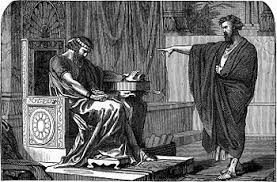
“The heart is deceitful and incurably wicked” (Jeremiah 17:9). The chapters we read today illustrate how the weakness and wickedness of the human heart were on display in King Zedekiah.
Jeremiah had prophesied the truth to King Zedekiah throughout his reign.
Jeremiah 37:2 2 But neither he nor his servants nor the people of the land listened to the words of the LORD which He spoke through Jeremiah the prophet.
Zedekiah was influenced by public opinion, the counsel of the false prophets, priests, elders, and court officials as well as his own sinful leanings. Despite this he continually makes hidden appeals to Jeremiah. He sends others to Jeremiah with a prayer request (Jer 37:3). A sign of faith? Not really. His heart will not yield to the Word of God, despite his private desperation.
Zedekiah asks for a private audience with the prophet and asks, “Is there any word from the Lord?” (Jeremiah 37:17)
Jeremiah proclaims that even though situations may appear to have changed, God’s message has not changed. “You will be handed over to the Babylonians”.
The Babylonian and Chaldean siege against Jerusalem had temporarily ended because it appeared that the Egyptian army was coming to defend Jerusalem. The Jews, who walked by sight, now claimed to have reason to reject Jeremiah’s prophecies.
Zedekiah thinks that if he treats Jeremiah more kindly, releasing him from the vaulted prison cell, the dungeon built in the house of Jonathan the secretary, Jeremiah’s prophecies might change.
The officials are angry at Jeremiah’s discouraging prophecies. Where were God’s promises of victory? Where were the promises of ‘no weapon formed against them prospering’? Weren’t they guaranteed God’s favor and exemption from judgment? After all, their city was the city of God, and they had the temple of God. Jeremiah was preaching gloom and doom. Therefore, they decided, he must be put to death!
Jeremiah 38:4 4 Then the officials said to the king, “Now let this man be put to death, inasmuch as he is discouraging the men of war who are left in this city and all the people, by speaking such words to them; for this man is not seeking the well-being of this people but rather their harm.”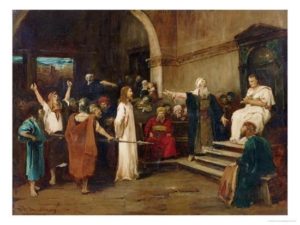
Jeremiah 38:5 5 So King Zedekiah said, “Behold, he is in your hands; for the king can do nothing against you.”
One cannot help but think of a similar situation when Pontius Pilate who tried to wash his hands of responsibility when faced with the crowd’s demands for the death of Jesus of Nazareth.
Jeremiah experiences the fellowship of our Lord’s sufferings. At first, he is despised and rejected, though free to come and go among the people (Jeremiah 37:4). Then he will be falsely accused, unjustly imprisoned, summoned to indulge the curiosity of the king, beaten, and thrown into a pit.
Jeremiah faithfully discharges the burden of the Lord, speaking the word that God had given concerning the coming judgment upon the city. He tells the officials:
Jeremiah 37:9-10 9 “Thus says the LORD, ‘Do not deceive yourselves, saying, “The Chaldeans will surely go away from us,” for they will not go. 10 ‘For even if you had defeated the entire army of Chaldeans who were fighting against you, and there were only wounded men left among them, each man in his tent, they would rise up and burn this city with fire.'”
When the Chaldean/Babylonian army withdraws because of Pharaoh’s army threatening to join forces with Jerusalem, Jeremiah attempts to leave the city. As he goes through the gates, he is falsely accused of treason (37:13).
Jeremiah 37:13 13 While he was at the Gate of Benjamin, a captain of the guard whose name was Irijah, the son of Shelemiah the son of Hananiah was there; and he arrested Jeremiah the prophet, saying, “You are going over to the Chaldeans!”
Jeremiah is led like a lamb to the slaughter. He is given no fair trial. He is given no defense. He is imprisoned in the dungeon that was built in the house of Jonathan, the secretary.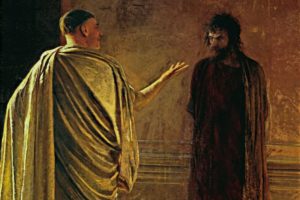
Zedekiah summons Jeremiah to appear before him privately. He is still curious to find out what the Lord has to say. He gives orders for Jeremiah to be released from the dungeon. Instead, he is to be held under guard in the courtyard (37:21).
From this new position, Jeremiah continues to prophesy the unchanging message regarding the future judgement. The officials reject God’s plan for their salvation. They are tired of hearing this discouraging news. They themselves want the preeminence. They want their city to be the center of all things. Jerusalem was their idol. Jeremiah prophesied its destruction. They now call for Jeremiah’s death:
Jeremiah 38:4 4 Then the officials said to the king, “Now let this man be put to death, inasmuch as he is discouraging the men of war who are left in this city and all the people, by speaking such words to them; for this man is not seeking the well-being of this people but rather their harm.”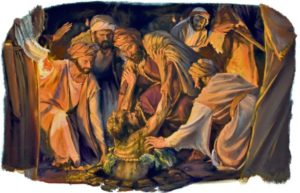
Jeremiah is then thrown into the cistern of Malkijah, and he sinks into the mud. An Ethiopian eunuch, Ebed-Melech, (meaning ‘servant of the King’), intercedes on Jeremiah’s behalf. Thirty men are sent to rescue Jeremiah from the miry pit, lifting him from the deep cistern with padded ropes.
It is interesting that Jesus is betrayed with thirty pieces of silver (The number 30 is often associated with ‘redemption’ in the Bible). Jeremiah is rescued with thirty men.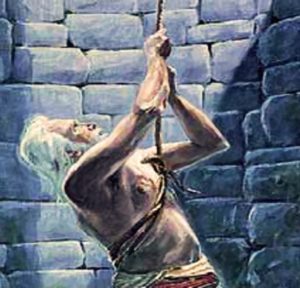
Once again King Zedekiah asks for Jeremiah’s counsel. “Do not hide anything from me.” Jeremiah once again communicates to King Zedekiah God’s plan for his salvation, but he refuses to heed it. In fact, he does not even want his officials to know that he was discussing it (Jeremiah 38:24).
The reading ends on this telling note:
Jeremiah 38:28 28 So Jeremiah stayed in the court of the guardhouse until the day that Jerusalem was captured.
This reminds me of a chorus I learned from medical missionaries:
Kingdoms may rise
Kingdoms may fall
Nations refuse to heed God’s call
But the Word of the Lord abideth forevermore!
TODAY’S READING FROM THE NEW TESTAMENT – 1 TIMOTHY 6:21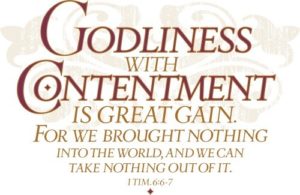
Paul continues to give Timothy pastoral instruction. He is to remind workers to respect their masters and not to take advantage of them if they are brothers in the faith.
1 Timothy 6:2b, but must serve them all the more, because those who partake of the benefit are believers and beloved. Teach and preach these principles.
Timothy is to have no tolerance for false teachers who will not submit to the Lord’s instruction and godly teaching. He is to ensure that the church does not get distracted by controversial, tangential, ‘quarrels about words’ promoting their own causes, and false grounds of righteousness.
A big chunk of this chapter has to do with recognizing that God is our source of supply and that we are His asset-managers. We are to steward all that He gives us to richly enjoy as those who must give an account. We must learn to be content with the simple things in life, most importantly the unspeakable gift of His life.
I learned from a nurse who had returned from a third world country where she had served on a medical mission, that no one needed anti-depressants. She said that there were many physical needs and that they were able to dispense much-needed medication and treatments, but no one seemed to be suffering of the anxiety and griefs that come with having too much stuff.
I have also found that joyfulness does not come easily to the wealthy. This is not an advocation of poverty, but it underscores what Paul says to Timothy. We are to learn contentment.
1 Timothy 6:10 10 For the love of money is a root of all sorts of evil, and some by longing for it have wandered away from the faith and pierced themselves with many griefs.
Money, in itself, is neither good nor bad. It is ‘the love of money’ that is ‘a root’, not ‘the root’ of ‘all sorts of evil’. So many crimes are committed because of ‘the love of money’. Poor decisions and the mistreatment of others occur because of ‘the love of money’. People are swindled, cheated and robbed, because of ‘the love of money’. People disregard their better moral sensibilities for ‘the love of money’. They give in to their foolish, harmful, destructive desires, for ‘the love of money’ (1 Tim 6:9).
It is not a sin to be wealthy, if our wealth enables us to do good for others. Jesus warns of the sin of covetousness. It is idolatry. He warns of the sin of greed. You are a fool if you fail to be rich towards God and lay up treasures in heaven. What does it profit a man if he gains the whole world and loses his soul?
Timothy is to give these guidelines:
- Realize that one day all riches will be gone (1 Tim 6:7,17).
- Be content with what you have (1 Tim 6:8).
- Check your motives in all financial decisions.
Is this transaction pleasing to God? What does this transaction reveal about what I value most highly? What good will this purchase bring? (1 Tim 6:9-10)
- Love people more than money (1 Tim 6:11).
- Love the Lord’s work more than money- pursue righteousness, faith love, perseverance and gentleness and lay up treasures in heaven (6:11, 17-18).
- Freely share what you have with others (6:18).
- Remember your accountability as a faithful steward. You are the Lord’s asset manager. What assets has He entrusted you with?
- Be thankful to God for what He richly supplies us for our joy. Learn the true CONTENT needed for CONTENTMENT- The Lord Himself (1 Tim 6:8, 17).
1 Timothy 6:6 6 But godliness with contentment is great gain,
1 Timothy 6:8 8 But if we have food and clothing, with these we will be content.
1 Timothy 6:17 17 Instruct those who are rich in this present world not to be conceited or to fix their hope on the uncertainty of riches, but on God, who richly supplies us with all things to enjoy.
Paul’s final word is a warning of the dangers of Gnostic mysticism:
1 Timothy 6:20-21 20 O Timothy, guard the deposit entrusted to you. Avoid the irreverent babble and contradictions of what is falsely called “knowledge,” 21 for by professing it some have swerved from the faith. Grace be with you.
TODAY’S READING FROM THE BOOK OF PSALMS – PSALMS 89:38-52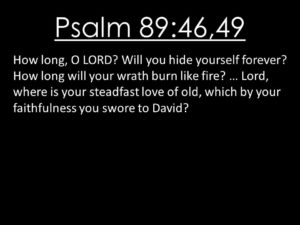
Considering today’s readings, we can imagine this section of Psalm 89 upon the lips of the prophet Jeremiah as well as the Psalmist.
You remember that the first part of this Psalm celebrated the glory of the covenant that God made with His king.
This part, the second part of the Psalm, laments the failure of the king(s) of Israel to keep covenant.
Psalm 89:38-39 38 But now you have cast off and rejected; you are full of wrath against your anointed. 39 You have renounced the covenant with your servant; you have defiled his crown in the dust.
We see the destruction of Jerusalem pictured in these verses:
Psalm 89:40 40 You have breached all his walls; you have laid his strongholds in ruins.
Psalm 89:44 44 You have made his splendor to cease and cast his throne to the ground.
Then there is an urgent reprise of the prayer: “How long O Lord?”
Psalm 89:46 46 How long, O LORD? Will you hide yourself forever? How long will your wrath burn like fire?
The Psalmist requests that the reproach that has fallen upon them be removed, but the faithfulness of the Lord is never questioned. There is perpetual praise in the heart of the Psalmist for the perfection of God’s ways.
Psalm 89:52 52 Blessed be the LORD forever! Amen and Amen.
TODAY’S READING FROM THE BOOK OF PROVERBS – PROVERBS 25:28
Proverbs 25:28 28 A man without self-control is like a city broken into and left without walls.
Self-leadership’, (self-awareness and self-discipline) is a great asset, and a fruit of the Holy Spirit’s indwelling (Gal 5:22-23). To be without it, is to be left defenseless to the desires of the flesh and the work of the enemy.
PRAY FOR THE NATIONS- SENEGAL
(from Operation World Prayer Guide- p. 730-733)
Senegal
Senegal
Republic of Senegal
Africa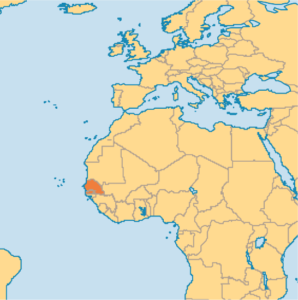
Geography
Area: 196,722 sq. km
Mainland Africa’s most westerly state: arid, with few natural resources.
Population: 12,860,717 Annual Growth: 2.66%
Capital: Dakar
Urbanites: 42.9%
HDI Rank: 166 of 182 (UN Human Development Reports 2009)
Peoples
Peoples: 57 (47% unreached) All peoples
Unreached Peoples Prayer Card
Official language: French. Language of wider communication, Wolof; spoken as a first language by around 40% of the population Languages: 46 All languages
Religion
Largest Religion: Muslim
|
Religion |
|
Pop % |
Ann Gr |
|
825,658 |
6.42 |
3.0 |
|
|
25,792 |
0.2 |
6.1 |
|
|
Muslim |
11,709,683 |
91.05 |
|
Challenges for Prayer
Bible translation. Much has been achieved in the last 25 years. At least seven long-awaited NTs are published, namely Wolof, Serer, Mandinka, Tukulor, Fulakunda, Jola Kasa and Bassari. Work is underway on 17 other translations, with several teams being led by Senegalese. Pray especially for work on several Jola languages (WEC, WBT). The Wolof OT is being translated. Just as vital is the work in literacy training – translations without readers are useless. Pray for the Scripture translation teams, and for widespread distribution of and response to the Scriptures.
Spiritually, Senegal is both open and closed. The nation enjoys religious freedom and is remarkably tolerant towards other faiths- a point of pride for Senegalese, perhaps because so few Muslims have ever come to Christ. Despite a long-standing Christian presence and outreach, a spiritual heaviness covers the land. Allegiance to religious leaders renewed in each generation prevents any significant people movement to Christ. Virtually all Wolof, Fulbe and Mande people remain Muslim. Pray for the spiritual breakthrough for which so many wait.
Islam dominates religious life., growing from about 45% of the population in 1900 to over 90% by 1960. The Muslim Sufi brotherhoods are well organized, wealthy and politically powerful; over 85% of all Muslims belong to one of them. Aggressive Islamist groups funded by Saudi Arabia and Libya are making inroads and threaten the tolerant status quo. Pray that religious tyranny might be thwarted, and that God may use all forces to draw people to Himself.
PRAYER: O Gracious God and Father, forgive us for the times when we fail to heed Your Word, when we tune in when Your commands agree with our fancy, and tune out when You challenge us to obedience in the hard thing. We live in the most affluent period of human history. Keep us from the snare of covetousness and the lure of ‘the love of money’. You are in the right when You declare that our sins are condemnable. We thank You for Your sovereign mercy demonstrated in the Holy One Who provided a refuge from Your wrathful judgment against sin. We thank You for Jesus, the perfect Savior, Who offered the perfect sacrifice, Who has made perfect peace on our behalf. May we walk worthy of the One who has called us to be holy and blameless in Your sight. In His Name, the matchless Name of Jesus, we pray. Amen.
Pastor David
